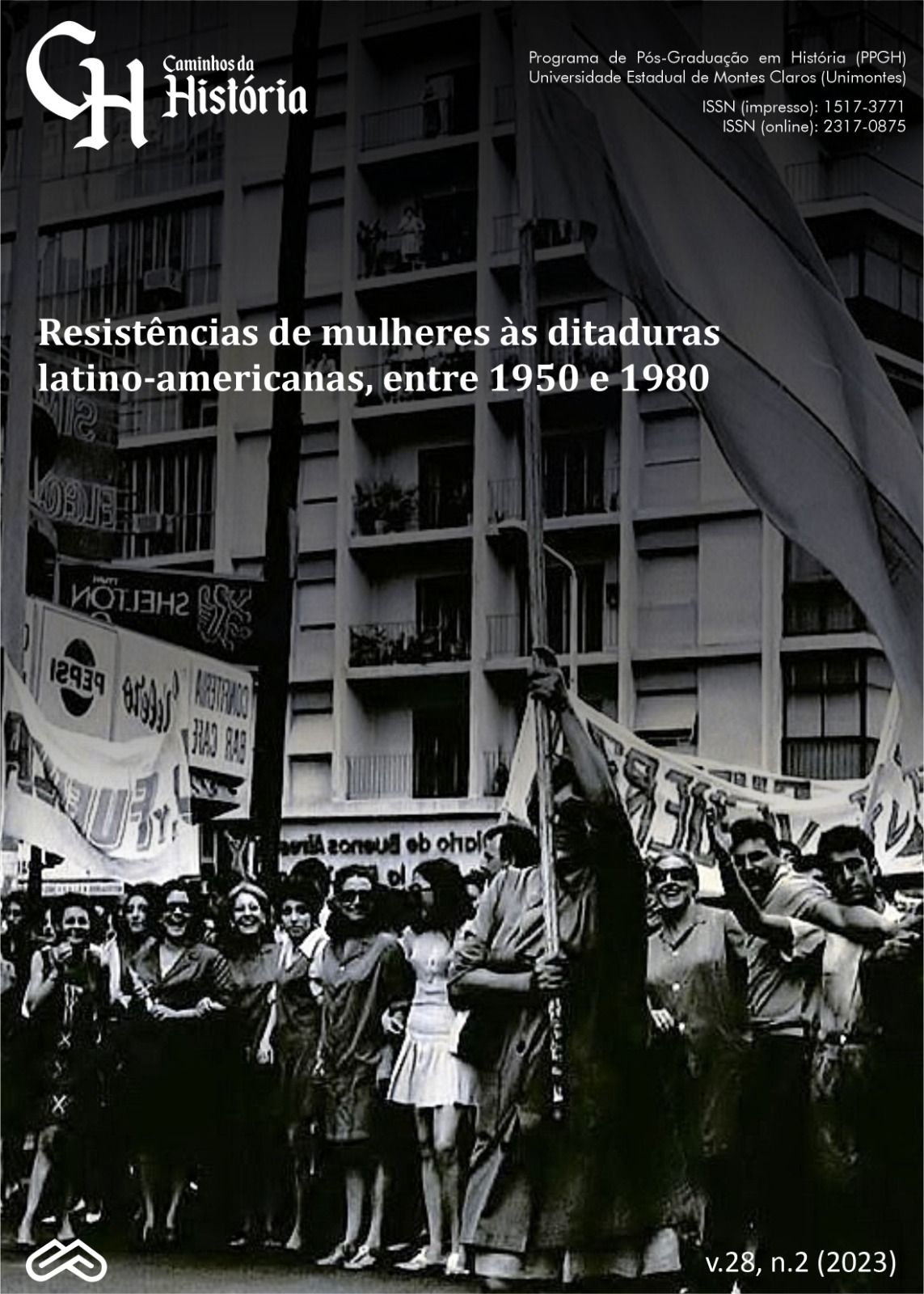Clandestine: stories of struggle and resistance against the Banzer dictatorship in Bolivia (1973-1976)
Clandestine: stories of struggle and resistance against the Banzer dictatorship in Bolivia (1973-1976)
DOI:
https://doi.org/10.46551/issn.2317-0875v28n2p.123-143Keywords:
Women, Miners, Class, Gender, RaceAbstract
This paper reconstructs part of the processes of struggle and resistance of the Committee of Housewives of the 20th Century during the strikes of 1975 and 1976 in Bolívia based on an analysis based on Antonio Gramci's concepts of subalternity, Silvia Federici's double oppression, intersectionality from the perspective of Sara Salem and the motley multitemporality of Silvia Rivera Cusicanqui. Seeking to answer, what were the strategies and organizational forms that miners in the 20th century gave themselves to the intervention, persecution, torture, murder and repression of the dictatorship? Is there a dimension that recognizes the multiplicity of oppressions for women and mining workers? Is the indigenous component another dimension of oppression? Do you recognize it as such? For which, it focuses its methodology on working with secondary oral sources, mainly women miners who have left their testimony in various written and audiovisual interviews. In this way, it is affirmed that the strategies of struggle and resistance are built from their relations of exploitation and oppression within the capitalist, patriarchal and racist system with the aim of questioning class exploitation and oppression of gender and race.
Downloads
References
ARDAYA, Gloria. La mujer en la lucha del pueblo Boliviano. Las Barzolas y el Comité de Amas de Casa. En Koschützke A. (comp.) Y hasta cuando esperaremos mandan-dirun-dirun-dan. Mujer y poder en América Latina. Venezuela: Editorial Nueva Sociedad, 1989, p. 183-202.
ASAMBLEA Permanente de Derechos Humanos de Bolivia. La huelga de hambre. Bolivia, Depósito legal D. L., 1978.
CAJÍAS DE LA VEGA, Magdalena. El movimiento minero y la democracia: el derrumbe del sindicalismo revolucionario, La Paz: Instituto Francés de estudios andinos, 2004.
CUSICANQUI, Silvia Rivera. Violencias (Re) encubiertas en Bolivia. La Paz-Bolivia: Editorial Piedra Rota, 2010.
CUSICANQUI, Silvia Rivera. Sociología de la imagen. Miradas Ch`ixi desde la historia andina Buenos Aires: Tinta Limón Ediciones, 2015.
CUSICANQUI, Silvia Rivera. Un mundo Ch`ixi es posible. Ensayos desde un presente en crisis. Buenos Aires: Tinta Limón Ediciones, 2018.
DE LA VEGA, Garcilazo. Los Incas. Comentarios Reales e los Incas, Perú: Ediciones El Lector S.R.L, 2012.
DUNKERLEY, James. Rebelión en las venas: La lucha política en Bolivia 1952-1982. La Paz-Bolivia: Plural editores, 2003.
FEDERICI, Silvia. El Calibán y la bruja: Mujeres, cuerpo y acumulación originaria. Buenos Aires: Tinta Limón ediciones, 2015.
FEDERICI, Silvia. El patriarcado del salario: Críticas feministas al marxismo. Buenos Aires: Tinta Limón ediciones, 2018
FIELD JR., Thomas C. Bolivia en y la alianza para el progreso en la era Kennedy. La Paz-Bolivia: Ministerio de Trabajo Empleo y Previsión social, 2016.
GARCÉS, María del Carmen. Domitila Chungara: Una Vida de Lucha. Argentina: Chirimbote, 2017.
GELABERT, T. Sales Repensando la interseccionalidad desde la teoría feminista. Agora: Papeles De Filosofía, v. 36, n. 2, p. 229-256, 2017. DOI: 10.15304/ag.36.2.3711. Disponible en: https://doi.org/10.15304/ag.36.2.3711
GRAMSCI, Antonio. Antología. Buenos Aires-Argentina: Siglo veintiuno editores, 2004.
HERNANDEZ, Juan. La Asamblea Popular boliviana (1969-1971). En: Guevara G. (Org.) Sobre las Revoluciones Latinoamericanas del siglo XX. Buenos Aires-Argentina: Newen Mapu, 2017.
LAGOS, María L. Nos hemos forjado así: al rojo vivo y a puro golpe. Historias del comité de Amas de Casa de Siglo XX. Bolivia: Asociación Alicia “Por Mujeres Nuevas”-Plural Editores, 2006.
LAVAUD, Jean-Pierre. La dictadura minada: La huelga de hambre de las mujeres mineras. Bolivia 1977-1978. La Paz: Instituto Francés de estudios andinos-Plural Editores. CESU, 2003.
ORDOÑEZ, Luis Oporto. El Comité de Amas de casa, la cara femenina de la resistencia minera. Contrahegemonía web en Semanario, 25 de noviembre. 2017. Disponible en https://contrahegemoniaweb.com.ar/2017/11/25/bolivia-el-comite-de-amas-de-casas-la-cara-femenina-de-la-resistencia-minera/ . Consultado el: 15 de mayo. 2023.
OSTRIA, Gustavo Rodriguez. Mujeres del Mineral. En Koschützke A. (comp.) Y hasta cuando esperaremos mandan-dirun-dirun-dan. Mujer y poder en América Latina, Venezuela: Editorial Nueva Sociedad, 1989.
PAREDES, Julieta. No pudieron con nosotras: El desafío del feminismo autónomo de Mujeres Creando. Bolivia: Plural Editores, 2006.
PARTIDO OBRERO REVOLUCIONARIO. Decidida la ocupación de las minas. Revista Masas n 423, pág. 1, 1973.
SIRPA, Teresa Canaviri; YAVETA Roxana Selum. Warmi. Mineral y copajira. Memoria de mujeres en diez cooperativas. La Paz-Bolivia: Ministerio de la Mujer de Bolivia, Federación Nacional de Cooperativas Mineras de Bolivia FENCOMIN y la Corporación Minera de Bolivia, 2005.
VIEZZER, Moema. Si me permiten hablar. Testimonio de Domitila una mujer de la mina, México: Siglo XXI Editores S. A, 2005.





















